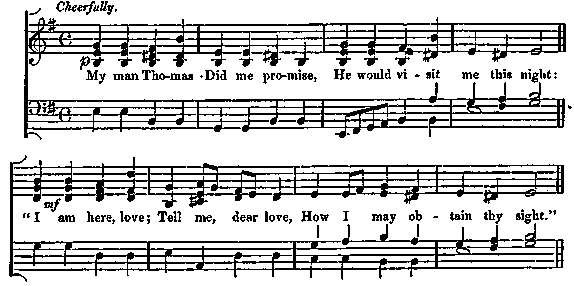Popular Music Of The Olden Time Vol 2
Ancient Songs, Ballads, & Dance Tunes, Sheet Music & Lyrics - online book
| Share page | Visit Us On FB |
|
|
|||
|
738 |
ENGLISH SONG AND BALLAD MUSIC. |
||
|
|
|||
|
The last sum, however, by the diminuendo of two pence at each verse, causes the song to end with—"I'll carry nothing home to my wife." Another version beginning—
" I love sixpence, a jolly, jolly sixpence." will be found in Ritson's Gammer GurtorCs Garland, or The Nursery Parnassus, and in Rimbault's Nursery Rhymes.
The tune was contributed to my first collection by the late T. Dibdin, " the last of the three Dibdins," and I then recollected having heard it sung to the words, "My man Thomas did me promise," when a schoolboy. This is my reason for printing those words to the tune, and the reader can form his own opinion of the probability or improbability of the tradition. I confess to small faith in anything of the kind, when the tunes are not to be found in print or manuscript; but some of the words of the nursery songs are certainly very old, and very few of the airs were published until quite a late period.
The words of " My man Thomas " are alluded to in A Crew of hind Gossips, all met to be merrie, by S[amuel] R[owlands] 4to., 1613, and in Fletcher's play, Monsieur Thomas.
In the former, one of the wives says of her husband— " He hath a song cald Mistris will you doe ? And My man Thomas did me promise too; He hath The Pinnace rig'd with silken saile, And Pretty Birds, with Garden Nightingale : lie tie my mare in thy ground, a new way, Worse than the players sing it in the play : Bessefor abuses, and a number more That yon and I have never heard before." Of the above-named songs, A pinnace rigg'd with silken sail is preserved in a manuscript written in the time of James I., now in the possession of Mr. Payne Collier, and Til tie my mare in thy ground is a well-known catch. In Fletcher's Monsieur Tliomas, act iii., sc. 3, the maid sings the first three lines of the following, and Thomas answers:— |
|||
|
|
|||
 |
|||
|
|
|||